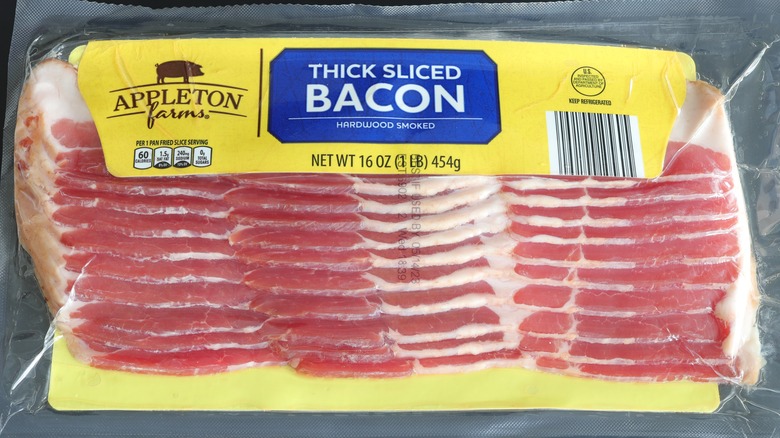The Aldi Bacon Myth You Need To Stop Believing
Aldi holds a special place in the hearts of many shoppers who want to keep their grocery budgets reasonable while still having access to quality foods and other products. The store does its part to maintain affordable prices with a small profit margin, which is part of why Aldi's meat is so cheap. This push towards lower prices unfortunately leads to much speculation and misinformation among consumers, which Aldi is quick to clear up.
Take the rumor that its private-label brand of bacon is actually grown in a lab, a claim that was quickly disseminated on social media and had consumers in a veritable tizzy. In a statement to the Associated Press, Aldi explained that the gossip was born out of a simple misunderstanding. The grocery store sells bacon under its exclusive Appleton Farms brand, which some consumers conflated with a company called Appleton Meats. The brand Appleton Meats appears to have been working on the development of lab-grown versions but the company has no affiliation with Aldi or its bacon.
Where did the lab grown meat rumor come from?
The Aldi-Appleton Meats rumor first popped up on Facebook at some point in March 2024, according to Snopes. Shared posts linked Aldi to Appleton Meats and included information on the latter company's goal of "exploring multiple cellular agricultural methods for growing ground beef, chicken, and mouse-meat cat treats." As pointed out in the Snopes post, eagle-eyed social media users should have detected that this claim was false based on the image included with many of the posts, which shows a bacon package clearly marked with the Appleton Farms brand.
While the FDA has given its first seal of approval for cultivated meat, the subject remains controversial among many consumers. Some people cite potential health concerns, which range from possible bacterial contamination to unknown long-term effects the consumption of lab-grown meat could have on humans. Some states are even mulling a ban on such products out of concern about the financial effects of the agricultural industry in the U.S. While the debate about cultivated meat is sure to rage on for some time, Aldi can be safely left out of the discussion for now.
Not the first time Aldi has faced controversy over its meat
The grocery store seems to be a lightning rod for unsavory meat-based rumors. Just consider the controversy over Aldi's purported use of horse meat in a product sold at its stores. Unlike the lab-grown meat rumor, it's true that the brand sold products containing horse meat in some European stores in 2013. However, the decision was not a deliberate one, as a French company called Comigel actually misrepresented its products to Aldi and other grocery stores. According to tests, certain products included a percentage of horse meat that ranged from 30 percent to 100 percent.
These products were never sold in the U.S. and Aldi took swift action when it discovered the issue. As for whether it's safe to eat horses, keep in mind that the meat is actually quite nutritious and is even treated as a delicacy in some countries. However, the vast majority of Americans find the notion of eating this type of animal distasteful and while there's not an outright ban, the sale of horse meat is not allowed in many states. As for Aldi, consumers shouldn't let a previous unfortunate incident and baseless rumors deter them from shopping at this beloved chain.


